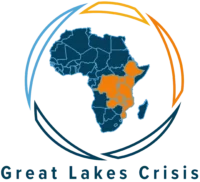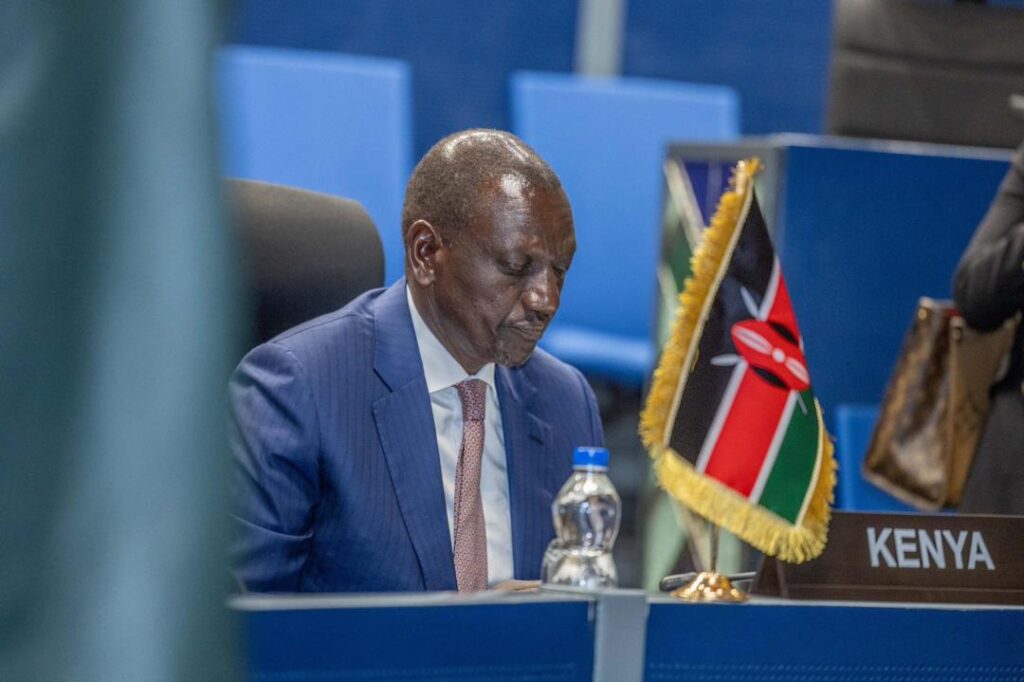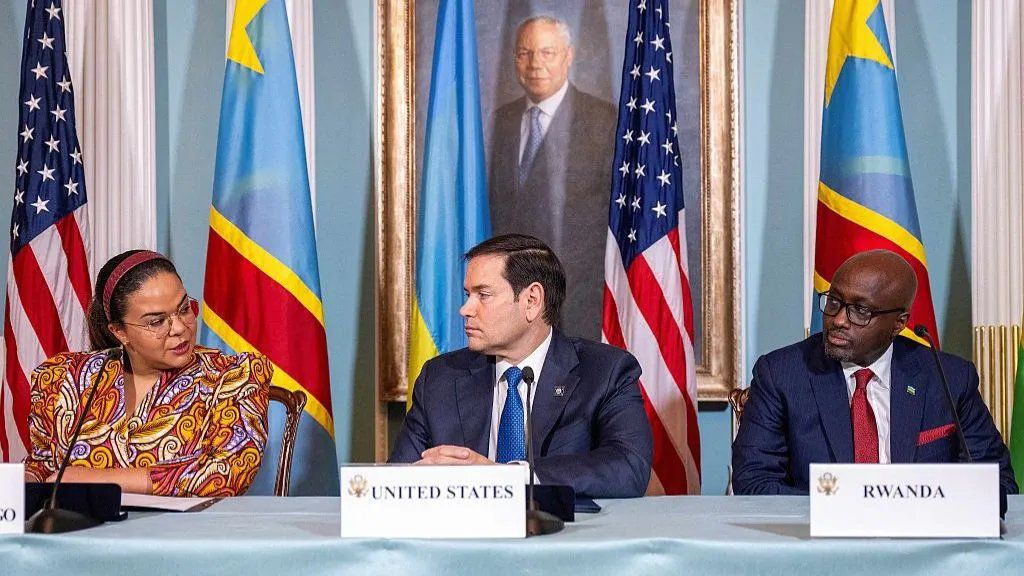Rwanda, a country once hailed as a model of post-genocide recovery and economic progress, is now at the center of an unprecedented diplomatic crisis. The nation finds itself targeted by a wave of sanctions from powerful Western nations, accused of fueling instability in the Democratic Republic of Congo (DRC) through its alleged support for the AFC/M23 rebel coalition group. From the European Union to the United Kingdom, Canada, and Germany, key development partners are cutting ties, suspending aid, and imposing travel bans and asset freezes on Rwandan officials and institutions. But can Rwanda withstand these growing sanctions, or is it on the brink of economic and diplomatic isolation?
This article examines the extent of the sanctions, the motivations behind them, the historical context of Western-Rwandan relations, and the possible outcomes of this crisis. Is Rwanda truly the aggressor, or is this a case of selective outrage that ignores Kinshasa’s own failures? And most importantly, what does this mean for regional stability and the future of Rwanda’s diplomacy under President Paul Kagame?
A Growing List of Sanctions: Who Has Acted Against Rwanda
In recent months, multiple countries and international organizations have taken punitive measures against Rwanda:
European Union (EU) : Sanctioned nine individuals and one entity, including a key figure in Rwanda’s mining sector and the Aldango gold refinery, accusing them of illicit resource exploitation in eastern DRC. These sanctions include travel bans and asset freezes. (The EastAfrican, 2025)
United Kingdom (UK) : Suspended direct bilateral aid to the Rwandan government and imposed diplomatic sanctions, including a freeze on military cooperation and trade promotion. (William, 2025)
Canada: On March 3,2025, Canda has suspended exports of controlled goods and technologies to Rwanda, halted new intergovernmental trade initiatives, and ended support for private-sector business development projects. Additionally, Canada announced that it will review its participation in international events hosted by Rwanda and closely scrutinize any future Rwandan bids to host global summits. From 2022 to 2023, Canada allocated $44.82 million in aid to Rwanda, supporting education, health, and gender equality initiatives. In 2023, trade between the two nations reached $13.4 million, with Canada supplying wheat, vehicles, and aircraft parts while importing Rwandan coffee and spices. Additionally, Canadian companies operate in Rwanda’s infrastructure, engineering, mining, and energy industries. (Pierre , 2025)
Germany : On March 4,2025,Germany announced the suspension of all new financial commitments and high-level meetings with Rwanda while reviewing existing aid agreements. Rwanda receives €50 million annually from Germany for development projects. (Federal Ministry for Economic Cooperation and Development , 2025)
Belgium : Following Rwanda’s decision to cutting diplomatic ties and expel Belgian diplomats, Belgium hit back with similar measures, with Belgian Foreign Affairs Minister Maxime Prévot saying the country will declare Rwanda’s diplomats persona non grata and denounce government cooperation agreements (Elian , 2025)
The United States of America(USA): The U.S. Department of the Treasury’s Office of Foreign Assets Control (OFAC) has imposed sanctions on James Kabarebe, Rwanda’s Minister of State for Regional Integration (US Department of the Treasury, 2025) .The sanctions against Kabarebe could strain Rwanda’s international relations and increase scrutiny of its involvement in the ongoing conflict in the DRC.
The growing international pressure reflects a coordinated Western response against Rwanda’s alleged involvement in eastern DRC. However, the crisis raises deeper questions: Is Rwanda solely responsible for the conflict, or is this part of a broader geopolitical strategy?
Is Rwanda Ready for Diplomatic Isolation?
Rwanda, a country of 14 million whose economic growth is often viewed as a success story in Africa, remains heavily dependent on external assistance. More than a quarter of its national budget of $4 billion comes from foreign aid, about $1.25 billion on average over the past several years. (World Bank Group, 2025)
Despite mounting pressure, the Rwandan government remains defiant. President Kagame has repeatedly asserted that Rwanda does not fear diplomatic isolation, prioritizing national security and sovereignty over international approval. Kagame’s administration maintains that the real issue is not Rwanda’s alleged support for the AFC/M23 but rather Kinshasa’s collaboration with the Forces Démocratiques de Libération du Rwanda (FDLR), a group composed of former génocidaires who fled Rwanda after committing atrocities in 1994.
As seen in the video above, where Kagame addresses his people regarding sanctions against Rwanda, he acknowledges the gravity of the situation. Switching between Swahili and Kinyarwanda, he urges Rwandans to brace themselves for tougher times ahead, repeatedly telling them to “tighten their belts” and stand firm in defense of their rights; rights he insists they must fight for.
Furthermore,Kagame has hinted at alternative partnerships beyond Western allies. China, Qatar, Russia, and Turkey have strengthened economic and military ties with Rwanda in recent years. Could these partnerships help Rwanda survive the economic impact of Western sanctions?
A Selective Outrage? Why Is the DRC’s Leadership Failure Overlooked?
A key argument from Rwanda’s supporters is that the West is applying double standards in the Great Lakes conflict. While Rwanda is heavily sanctioned, the DRC government; despite its own human rights abuses, corruption scandals, and failure to control armed groups; is largely left unchallenged.
For years, Kinshasa has struggled to govern its vast territory, allowing dozens of militias, including the notorious FDLR, to operate freely. President Félix Tshisekedi’s government has repeatedly failed to implement peace agreements, leading to continued violence. Yet, the international community’s focus remains fixed on Rwanda, ignoring the broader instability caused by Kinshasa’s leadership.
Is the West truly seeking justice, or is Rwanda being targeted due to its growing independence from traditional Western allies?
Can Sanctions Collapse Rwanda’s Economy? Lessons from Other Sanctioned Countries
History shows that economic sanctions can have mixed outcomes; some regimes collapse, while others adapt and even thrive.
Countries That Survived Sanctions:
Russia: Despite heavy sanctions after its invasion of Ukraine, Russia strengthened economic ties with China, India, and Middle Eastern nations to maintain stability.
Iran : Decades of Western sanctions forced Iran to develop a self-sufficient economy, expanding trade with China, Russia, and Turkey.
Zimbabwe : Despite crippling Western sanctions, Zimbabwe continues to function, largely due to economic ties with China and resource exploitation.
Countries That Struggled or Collapsed Under Sanctions:
Sudan: U.S. and UN sanctions weakened Sudan’s economy, contributing to political instability and the fall of Omar al-Bashir’s regime.
Libya :Sanctions played a role in the destabilization of Libya, leading to the overthrow of Muammar Gaddafi.
Venezuela :Economic sanctions against Venezuela accelerated hyperinflation and economic collapse, causing a humanitarian crisis.
Rwanda, with its resilient economy and alternative global partnerships, may avoid complete collapse. However, if sanctions continue to escalate, key sectors such as trade, investment, and military operations could face severe disruptions.
What Next? Possible Outcomes of the Diplomatic Crisis
Rwanda Seeks Alternative Alliances ; As seen with Russia and Iran, Rwanda may deepen ties with China, Qatar, and Turkey, reducing its reliance on Western aid.
Sanctions Escalate, Forcing Concessions; If economic pressure becomes unbearable, Rwanda may be forced into diplomatic negotiations with Western powers, possibly leading to policy shifts.
Regional Instability Intensifies; If Rwanda is further cornered, it may escalate its military actions in eastern DRC, leading to greater regional instability.
Western Allies Reassess Their Approach; If sanctions fail to change Rwanda’s policies, Western nations may reconsider their stance to avoid losing influence in the Great Lakes region.
Conclusion: A Defining Moment for Kagame and Rwanda
Rwanda is at a crossroads. The country faces an unprecedented diplomatic siege, yet Kagame remains resolute in defending his nation’s sovereignty. The outcome of this crisis will not only shape Rwanda’s future but also redefine Africa’s relationship with Western powers.
As the West tightens its grip, will Rwanda bend under pressure, or will it emerge stronger, charting a new course of self-reliance and strategic partnerships?
What do you think? Will Rwanda withstand the storm, or is it heading toward deeper isolation? Share your thoughts and join the conversation.
Works Cited
The EastAfrican. (2025, March 17). EU Sanctions Rwanda officials ahead of Eastern DR Congo peace talks. From East africa: http://www.theeastafrican.co.ke
William, J. (2025, February 25). UK to suspend bilateral aid to Rwanda over Congo Conflict. From Reuters: http://www.reuters.com
Pierre , M. (2025, March 5). Canada issues economic sanctions against Rwanda amid escalating conflict with the DR Congo. From Bankable: http://www.bankable.africa
Federal Ministry for Economic Cooperation and Development . (2025, March 4). Germany suspends New Development Funding to Rwanda. From Situation in eastern DRC: http://www.bmz.de
Elian , P. (2025, March 17). Rwanda cut ties with Belgium over Congo Conflict and the EU Sanctions. From The New York Times: http://www.nytimes.com
US Department of the Treasury. (2025, February 20). Treasury sanctions Rwanda Minister and Senior Militant for Conflict in the Democratic Republic of Congo. From Press releases: http://www.home.treasury.gov
World Bank Group. (2025). Data Bank. From World Development Indicators: http://www.databank.worldbank.org



Le Rwanda est une petite economie qui ne peut être comparé à la Russie, et d’ailleurs la Libye qui avait une forte économie n’a pas sû tenir!! Sa chutte est pour bientôt
Merci, cher Makolo, pour votre réaction. Cependant, il est difficile d’affirmer avec certitude que sa chute est imminente. Compte tenu de la versatilité de la communauté internationale, il se peut que ces sanctions ne restent que des annonces sur papier, sans réel impact sur leurs affaires courantes.
Given Rwanda’s advancements after the 1994 crisis , it is impossible to downplay it’s resilience under President Kagame’s leadership. However, the current diplomatic storm and sanctions strikes the core of Rwanda’s economic model which is dependent on foreign aid and multilateral partnerships— this is different unlike the typical civil war that had happened before within the country and within the great lake regions, this is a global issue now and Rwanda is being sieged .
Kigali’s search for other relationships illustrates a tactical outlook which is great, but pivoting abruptly away from Western support raises the risk of short-term isolation hence Rwanda might find it challenging to endure this storm without incurring serious internal and external negative effects / outcomes unless if it can find a way to successfully address this global issues while preserving its sovereignty at the same time , other than that it’s gonna be very difficult to withstand the storm .
You’re absolutely right Dear Marriam, this crisis goes beyond Rwanda’s past internal conflicts and directly challenges its aid-dependent economic model. While Kigali’s shift toward new alliances shows strategic intent, a sudden pivot from Western support risks isolation. The real challenge lies in balancing sovereignty with smart diplomacy to weather this global storm without major fallout.Appreciate your contribution to the discussion.